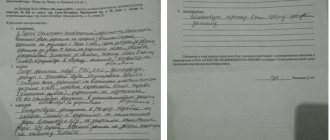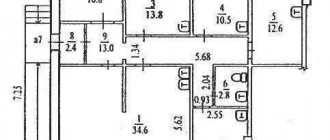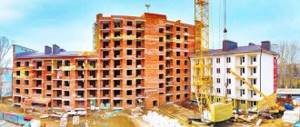Advantages of DDU for investors
- Strict regulation of the text of the contract. It specifies the responsibilities of each party. Information about the object is described in detail: its footage, apartment number, its layout. After signing the document, the shareholder automatically becomes the mortgagee, and the developer - the mortgagor. Land is used as collateral property. It is subject to foreclosure if the developer fails to fulfill its obligations.
- Mandatory registration. DDU is registered with the cadastre and cartography authorities. This eliminates the possibility of “double selling” of the same object. DDU for one object will not be registered a second time.
- Financial responsibility. Failure to comply with the deadlines for the delivery of the object is fraught with monetary compensation for the developer to the shareholders. All they have to do is go to court.
- Quality assurance. 214-FZ imposes a five-year warranty on the object, which is covered by the developer.
If the DDU is registered in the name of one of the spouses
The division of an apartment purchased under a DDU between spouses differs little from the division of housing purchased under a sales contract.
When a DDU is drawn up during a marriage and contributions for the apartment are paid from the general family budget, it does not matter for which of the spouses the agreement is drawn up. The rules of common family property apply to such real estate. This means that upon division through the court, each spouse will receive exactly half.
How an apartment is divided according to the DDU between spouses during a divorce.
When a contract is drawn up for one of the spouses outside of marriage, the division of acquired property will depend on the investment in real estate of the second party. If the debt was fully paid from the general family budget, the apartment will be divided in equal shares between the spouse listed in the documents as the owner and his marriage partner. Provided that the debt was paid by both spouses, but their investments were unequal, the property can be divided between them in certain shares, the size of which depends on the funds invested by each.
Risks for investors
Construction freeze
In accordance with 214-FZ, the investor is a third-priority creditor. In case of bankruptcy of a construction company, the return of its funds is carried out only after the requirements of banking organizations, company employees, etc. are satisfied. According to statistics, the largest number of unfinished buildings occur in the Leningrad, Moscow, Voronezh regions and Krasnodar Territory.
Housing encumbrance
For construction, the developer can raise borrowed capital. Moreover, banks issue in tranches. Housing under construction is used as collateral. In case of failure to fulfill obligations to credit institutions, apartments sold under the DDU receive an encumbrance.
Double sale
Possible prior to registration of the DDU with the authorized bodies. In accordance with the law, the document registered first is considered valid. Other investors will be denied registration. Most often, intermediaries resort to such fraudulent schemes. They buy housing at the initial stages of construction at cost and sell it after a certain period at the market price to several buyers. The first person to register the contract becomes the owner of the home. For the rest, the intermediary returns the cost of the object specified in the contract, that is, several times less than the amount they paid.
Changes in design documentation
The construction company may make adjustments that are not for the better for the investor. They may affect the layout and total area of the apartment. After the property is handed over, the shareholder may receive housing that does not meet his stated requirements. The trial could take several years.
Price increase
The legislation does not recognize the construction of a residential building as an investment project. The price of the apartment includes VAT of 18%. The procedure for making additional payments when increasing the area of living space is determined by the developer. In some cases, this leads to a serious increase in price.
Postponement of project delivery deadlines
The construction company can postpone them for an arbitrary period. In order not to pay compensation to shareholders, she must provide a valid reason.
Possible risks
Although the adopted Federal Law of the Russian Federation No. 214 now provides significant protection to shareholders, certain risks when registering a DDU remain. The fact is that the law does not provide a clear definition of a contract. Its content, in fact, is left to the developer. You can enter any deadlines for completing the work, transfer rules and the cost of the object being handed over into the text.
Should donated property be divided?
Not really
The law also does not provide for a procedure for increasing the monetary contribution if the area of the apartment was increased during the construction process. This means that the developer can draw up an agreement in his favor.
To minimize risks, before signing the text must be shown to a lawyer specializing in the Russian Housing Code. Without significant experience, it is very difficult for a shareholder to understand the problem on his own. The text of the DDU itself is large and contains many specialized terms. When proofreading, the main attention should be paid to the points that stipulate the responsibilities of equity holders and developers to each other.
The new version of the law allows for maximum protection of the interests of shareholders. But this applies to developers who generally do their work conscientiously. In the same area, there are a huge number of fraudulent schemes in which the developer is initially unscrupulous. If he withdraws the contributions made, freezes construction and disappears with the money, then the shareholders are left without money and without housing. In such situations, the state leaves people practically without help. They've been waiting for years to unfreeze construction and get their money back. As of 2021, there are more than 150 thousand defrauded shareholders in the Russian Federation.
When does the shareholder have the right to terminate the contract?
The shareholder may terminate the agreement unilaterally if:
- the deadline for the transfer of the object was violated by more than two months;
- there are complaints about the quality of construction work;
- the developer cannot provide a guarantee.
If an individual acts as a shareholder, then upon termination of the DDU on his initiative, the construction company returns to him all invested funds and pays a penalty equal to 1/150 of the refinancing rate. This is a kind of fee for using the investor's funds.
The only reason why the developer can cancel the contract is if the investor fails to pay according to the document.
Preparation of contract
The rules for compiling the text of the DDU are set out in Art. 4 Federal Law of the Russian Federation No. 214. According to the document, the agreement is concluded only in writing. It is mandatory for him to make a registration entry in Rosreestr. The text of the DDU itself contains the following information:
- determination of the residential property in respect of which the contract is being drawn up. The item must be spelled out especially carefully, indicating the number of rooms, their footage, construction materials, information about the entire apartment building, etc. Plus, a diagram-drawing is attached to it, allowing you to determine the relationship of the apartment to other rooms in the house;
- the period during which the developer is obliged to put the housing into operation;
- the cost of the apartment, the amount of individual contributions and the procedure for making them by the shareholder;
- warranty conditions on the part of the developer;
- the procedure for transferring a share under the DDU in the event of the death of the shareholder;
- the developer's liability if the object is damaged or destroyed for reasons beyond his control.
The text of the agreement is extensive.
It is advisable to involve a qualified lawyer to proofread it before signing. When drawing up an agreement, a married couple should pay attention to the clauses that stipulate the option of dividing the share in the event of family breakdown, if one is present in the text. You can start living in an apartment under a shared participation agreement only after a long period of time after its conclusion. This fact is also reflected in the rules for dividing real estate acquired under the DDU. Until it is officially put into operation, the division of rights is impossible.
Mandatory clauses of the DDU
The agreement can be drawn up in any order. However, 214-FZ highlights some points that must be present in the text of the document without fail.
- A clear description of the investment object. It can be residential or non-residential premises. It should be described in as much detail as possible, according to the project documentation. The text indicates the total area, layout, floor, apartment number, location.
- Exact construction completion dates. The DDU must indicate a specific date after which investors can approach the court.
- Price. The full cost of the property, the scheme and its repayment period are indicated.
- Guarantee. It is indicated that the developer bears warranty obligations during the operation of a residential building. The minimum term is five years. Shorter periods are unacceptable.
- Responsibility. The actions that will occur if each party fails to comply with the terms of the transaction are described: the possibility of termination, financial compensation, etc.
Before signing the document, it does not hurt the investor to study the financial documentation of the developer. Particular attention should be paid to annual reports for three or more years, balance sheet, distribution of profits and losses.
Important! You cannot enter into a DDU if the developer does not have permits for construction. In most cases, investors lose their capital due to illegal construction.
The right to a land plot can be checked by cadastral number in the State Register. This will eliminate double transactions.
Whose money was used to buy the apartment?
The law provides for various options for registering a child-care facility depending on the number of participants in one family:
- An agreement on participation in shared construction can be drawn up by one of the spouses before marriage. All monetary contributions are also paid by the host before the wedding. If the construction of housing ends during the marriage, ownership of the apartment is still registered only in the name of one of the spouses. The reason for this decision is that only the personal savings of the person who issued the DDU were spent on the purchase of housing. As a result, in the event of a divorce, such an apartment cannot be divided between spouses.
- The participation agreement was concluded before the wedding for one of the future spouses. Repayment of cash contributions occurred during family life from the general budget. The rule of common joint ownership applies to such real estate. This means that in the event of divorce, it must be divided equally between the spouses.
- If the share of the apartment was registered before marriage in the name of one of the future spouses. During family life, husband and wife made contributions from their personal funds. In this case, during a divorce, the property is divided into shares depending on the amounts contributed by each party to pay off the debt. In this situation, for a correct judicial decision, evidence of the contribution of personal money by each party is necessary. These include payment receipts and bank statements.
- The apartment was purchased under a share participation agreement before marriage. Part of the fees was paid by its owner before the wedding from personal funds, and part was paid after the marriage from the general family budget. If there is evidence, the property will be divided into parts according to the amounts contributed. The spouse who is not the legal owner of the apartment will receive a share equal to half the amount paid after marriage.
- The equity participation agreement was drawn up during marriage, and at that time all necessary contributions were fully repaid. In this case, the housing is clearly recognized as jointly acquired property, which means that when the property is divided in 2021, each spouse will receive half.
- The DDU was issued before the marriage or after the wedding, and subsequently one of the parties formalized the assignment of rights to the real estate. In this case, the owner will be the person who received the rights under this transaction.
Whenever and in what shares the apartment is registered, it will be subject to division only after completion of construction and official entry into ownership. This means that in some cases such real estate will only be able to be divided several years after the divorce.
The Art of Disguise
Unscrupulous developers still practice “gray schemes” that allow other mechanisms to be passed off as DDU.
- Among them, the most common fraudulent ploy is the preliminary agreement of the DDU. It is not covered by the guarantees of 214-FZ. It is assumed that this is an intermediary link on the path to official preschool education. The developer is obliged to conclude a formal agreement with the investor after the construction of the facility. In fact, the preliminary document does not give the shareholder the right of ownership of the home. It is not registered with authorized bodies, so it is a red light for direct sales. Often, according to a preliminary DDU, an object is sold several times.
- Borrowing funds against a bill. The scheme involves the execution of a preliminary agreement and an agreement to purchase a bill of exchange. The price of the security is comparable to the price specified in the DDU. Essentially, the investor pays for the purchase of the apartment in advance. In fact, there is no connection between these two documents. Upon completion of construction work, the developer can return the money to the investor, not the housing. Moreover, the condition for concluding an official DDU may be a price much higher than the cost of the bill. As a result, it turns out that the equity holder lent money to the construction company for several years without interest.
The difference between DDU and purchase and sale
The procedure for purchasing housing on the terms of shared construction is gaining increasing popularity in Russia. When people talk about this form, they are first of all interested in how it differs from a standard real estate purchase and sale agreement.
By drawing up a purchase and sale agreement, the payer buys ready-made housing. With DDU, they acquire a share in real estate, which in reality does not yet exist, it is only at the construction stage. The equity participation agreement in 2021 is regulated by Federal Law No. 214 (dated December 30, 2004).
In the legal sphere, a transaction carried out through the conclusion of a DDU does not relate to real estate transactions. Such an agreement regulates the relations of the parties regarding the transfer of property that does not exist in reality at the time of its signing.
If, when concluding a purchase and sale agreement, the buyer receives ownership of the apartment after a specified, not very long period of time, then this is not the case with the DDU. By making a full cash payment, you can obtain ownership of the home in a few years. Those. to some extent, the equity participation agreement in 2021 can be regarded as a form of investment.
Precautionary measures
The first step is to study the norms of 214-FZ. They will answer frequently asked questions related to equity investing.
A reliable developer is the best way to protect yourself from investment risks. When choosing it, carefully study the financial statements and constituent documents. 214-FZ gives shareholders the right to demand any information about the activities of the construction contractor. You can read reviews about the company, but you shouldn’t trust them 100% - negative information may be left by competitors. More informative than reviews is the audit report for the last year, the profit and loss statement, and the developer’s net assets.
You should not enter into schemes other than DDU. They are aimed at circumventing the Federal Law “On participation in shared-equity construction.” Therefore, they are not covered by any warranty.
There are many risks associated with DDU. Unfortunately, 214-FZ still has loopholes that unscrupulous developers take advantage of. The guarantee of receiving an object in accordance with all the requirements specified in the law is not always one hundred percent. Real estate market experts suggest potential clients learn a simple rule: “Transfer money only after a registered DDU.” Only in this case can you save your capital, time and nerves.
Risks of purchasing an apartment under a shared participation agreement in construction
When purchasing a property at the construction stage, you need to pay attention to what kind of agreement is signed between the parties. Acceptance of participation in shared construction is established by the agreement of shared participation in construction.
Due to the fact that only this agreement is a document of title, the conclusion of a preliminary equity participation agreement (PEDA) does not entail the acquisition of rights to the apartment in the future.
Within the meaning of the law, any preliminary agreement acts as an obligation to conclude a main agreement (for example, on the transfer of property or provision of services) in the future on the terms and within the terms provided for by the preliminary agreement (Article 429 of the Civil Code of the Russian Federation).
With the adoption of amendments to Federal Law No. 214, the activities of the developer began to be controlled more strictly by the state. The financial risk of shareholders has decreased - from July 1, 2021, funds received from citizens and legal entities. persons are stored in special escrow accounts . The developer will have access to them only after the building is put into operation and state registration of ownership of at least one apartment.
While the money is stored in escrow accounts, it is insured by a specially created Fund for the Protection of the Rights of Citizens - Participants in Shared Construction. It guarantees protection against financial losses in the event of bankruptcy of the developer. On the Foundation's website you can also view information about housing under construction or information about the developer.
For shared participation in the construction of an apartment building, risks of various types :
- financial;
- regarding the quality of the apartment;
- registration of property rights;
- increasing the time frame for putting a house into operation, etc.
Failure to meet construction deadlines
One of the most common risks of shared participation in construction is violation of the deadlines for the construction of an apartment building. The construction process may drag on for several months or stop altogether.
The reasons may include circumstances related to the following:
- The developer does not have sufficient funds of his own to complete the construction. In this connection, he relies on the use of funds acquired from the sale of apartments, but does not take into account the economic factors affecting the value of real estate.
- The funds paid by the shareholders were used to complete the construction of other facilities .
- Contractors do not fulfill their obligations for various reasons, which causes problems with the supply of construction materials.
To prevent such a case, the parties must, when agreeing on the terms of the contract, indicate a calendar date (or quarter) for the completion of construction and delivery of the house.
Thus, the shareholder, otherwise, will have the right to demand:
- penalty for delay (clause 2 of article 6 of Federal Law-214);
- or termination of the contract if the transfer of the apartment is delayed for more than 2 months or construction is stopped (clause 1, part 1.1, article 9 of Federal Law-214).
If the developer is delayed in putting the property into operation, he will have to pay a penalty , even if he warns the shareholders in advance.
Changes in the developer's project declaration
The project declaration is a mandatory document in the construction of an apartment building, in which the first part contains information about the developer , and the second - the construction project .
Clause 2 art. 19 of the Federal Law “On Participation in Shared Construction of an Apartment Building” stipulates that the project declaration must be published in the media by the developer, otherwise he has the obligation to present it to any person who wishes to familiarize himself with it.
In case of significant changes to the points of the project declaration, such as:
- project of an apartment building under construction;
- the size of its objects;
- purpose of non-residential premises or common property of an apartment building, etc.,
The shareholder has the right to demand termination of the DDU , as a result of which the money must be returned. But in most cases, the developer is reluctant to return the money paid and delays it in every possible way.
A risk may arise such as the developer requiring additional payments due to the need to carry out work not provided for in the contract (improvement of the territory, connecting the house to utility networks, payment of rent for a construction site, etc.) or increasing the area of the facility during the construction process.
To prevent such a situation, the contract must contain a condition that the cost per square meter is fixed, the price is final and no additional payments will be required.
Double sale of an apartment
Selling an apartment to several shareholders is possible in several cases:
- the developer and the real estate agency did not provide each other with information about the sold objects in a timely manner;
- when concluding agreements: preliminary agreement on equity participation;
- assignments;
To avoid risks, the buyer, when purchasing an apartment from a contractor, must request from him a certificate of fulfillment of his obligations to the developer.
With the adoption of Federal Law No. 214-FZ of December 30, 2004 “On participation in shared construction of apartment buildings,” the possibility of double sales is minimal , since the shared participation agreement is subject to state registration and is considered concluded only after it is completed (clause 3 of article 4 of the Federal Law). 214).
During the registration process, the shared construction object is checked for the absence of other contracts registered for it.
Registration of ownership of a shared construction project
Problems that arise for a shareholder when registering property rights may be caused by the following:
- obligations to state investors ;
- the developer did not prepare the documents necessary to register ownership.
Registration of ownership of a shared construction project is carried out on the basis of a permit to put the house into operation and a transfer facility (clause 2 of article 16 of Federal Law-214).
If for any reason the developer does not transfer permission to put into operation an apartment building, state registration of the shareholder's ownership rights is impossible (the apartment is an unfinished construction project).
In this case, it is necessary to demand recognition of ownership rights in court on the basis of available documents: a share participation agreement, payment documents, an apartment acceptance certificate.








